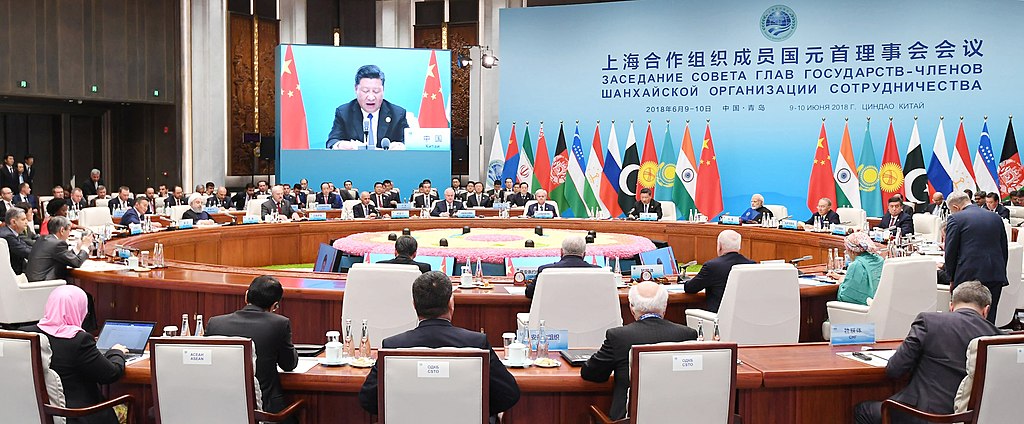
The Prime Minister, Shri Narendra Modi at the Plenary Session of the Shanghai Cooperation Organisation (SCO) Summit, in Qingdao, China on June 10, 2018. Prime Minister’s Office, Government Open Data License – India (GODL-India) / Wikimedia Commons.
Lessons from the enlargement of the Shanghai Cooperation Organization
Akram Umarov est lecturer, University of world economy and diplomacy (UWED), Tashkent, Uzbékistan. Fulbright Visiting Scholar, Center for Governance and Markets, University of Pittsburgh.
On 17 September in Tajikistan, the Shanghai Cooperation Organization (SCO) annual Summit was attended by the Presidents of the six founding members (Tajikistan, Kazakhstan, Kyrgyzstan, Uzbekistan, China, Russia), the Primer ministers of the two members admitted in 2017 (India, Pakistan), the President of three Observer States (Mongolia, Iran, Belarus), the Prime minister of a Dialogue-partner (Armenia) and the President of a guest-attendee (Turkmenistan).
The Summit addressed sustainable development of participating states, maintaining stability and security in the SCO space, strengthening cultural and humanitarian cooperation. In all, thirty documents were signed, including the Dushanbe Declaration of the 20th Anniversary of the SCO, the decision to start the procedure admitting Iran’s full membership, granting Qatar, Egypt and Saudi Arabia the status of Dialogue partners, and a MoU between the SCO Secretariat and the Commission of the Eurasian Economic Union, and others.
The two major results of the Summit are:
- The leaders of the SCO contrasted their positions on the Talibans’ seizure of power in Afghanistan and whether or not to cooperate with them. The President of Tajikistan, Emomali Rahmon, largely supported by the Indian Prime Minister Narendra Modi, took the toughest position against interactions with the Taliban movement. According to them, the Talibans are not fulfilling their obligations to create an inclusive government and the movement wants to rule the country alone, ignoring the ethnic diversity of Afghanistan. Mr Rakhmon even underlined that the “tough medieval Sharia law” imposed by the Talibans will “not lead to anything good”. Considering the unstable situation in neighbouring Afghanistan the participants discussed creating an obstacle “security belt” in the path of extremists around this country.
In contrast to Tajikistan- and India’s stances, the Pakistani Prime Minister Imran Khan said that the Talibans’ seizure of power in Afghanistan allegedly went almost to the benefit of security in the entire region and the Taliban movement should not be “demonized”. Vladimir Putin and Xi Jinping underlined that Afghanistan needs urgent support and assistance, the relevance of using SCO-Afghanistan Contact Group in facilitation of a smooth transition in Afghanistan. The Uzbek President Shavkat Mirziyoyev, in line with his colleagues, urged other nations to unfreeze Afghanistan’s assets kept in foreign banks in order to facilitate dialogue with the Taliban government in Kabul.
The SCO could thus not demonstrate solidarity in its plans to deal with the new realities in Afghanistan after the Talibans’ seizure of power. Each country stood on its positions considered as national interests and did not demonstrate willingness to find a common ground with other counterparts. Practically the only thing that the Summit participants managed to agree on s for Afghanistan was that there is a need to provide urgent humanitarian assistance to the population of the country and to reinforce security cooperation between the member states to prevent potential security threats and challenges from this territory.
- The start of the process of Iran’s full membership in the SCO and approval of Qatar, Saudi Arabia and Egypt’s candidacies as Dialogue partners were focal points of Dushanbe meeting. Iran has been awaiting this decision for the last 16 years after the country gained the status of Observer state. Accepting the other three countries as Dialogue partners has the aim to demonstrate a capacity to keep a geopolitical balance within the SCO by having on board a variety of Middle Eastern countries even if they may not have perfect relations between each other. This decision has the following implications for the future perspectives of the SCO:
– Russia and China, by promoting the full membership of Iran in the organisation, would like to demonstrate again that they are far from observing Western-driven economic sanctions and political isolation of Tehran. In the current period when both Beijing and Moscow have strained relations with the US and the EU, this symbolic act of Iran’s admission to the SCO aims to demonstrate the level of sovereignty in Russian and Chinese foreign policies.
– The SCO is no more a Central-Asia-focused regional organisation as it was initially established back in 2001. Starting from the admission of India and Pakistan as full members in 2015, the organisation is going through substantial transformation into a wider Eurasian organisation with multiple members and broad cooperation agenda. The role and influence of Central Asia is gradually declining within the SCO.
In conclusion, the further expansion of the number of the SCO members is considerably changing its activities concentration area and transfer it to the institution with broader scope. However, considering the existing difficulties with finding common positions within the current members on variety of political, economic and security issues, the implementation of the signed agreements, the expansion of the organization could potentially complicate further unity and consolidation in the SCO. Especially having on board countries which have significant problems in bilateral relations with each other may affect negatively the promptness and strength of the Shanghai Cooperation Organization. However, it will still keep significance as important platform for discussion and engagement between leaders of the member states. The bilateral meetings on the sidelines of the SCO gathering can be effective mechanisms for regular talks and exchanges on sensitive issues within the organization.
Akram Umarov, "The 2021 SCO summit. Lessons from the enlargement of the Shanghai Cooperation Organization". Décryptage de l'actualité [en ligne], 01.10.2021, https://observatoire-multilateralisme.fr/publications/is-the-sco-turning-into-a-new-presidential-club/
